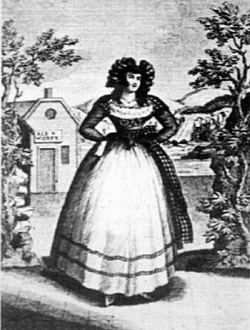Louisa Fontenelle facts for kids
Quick facts for kids
Louisa Fontenelle
|
|
|---|---|

Louisa Fontenelle as Moggy McGilpin in The Highland Reel at Covent Garden ca. 1788. Engraving by Barlow.
|
|
| Born | 31 August 1769 London, England
|
| Died | 30 October 1799 (aged 30) Charleston, South Carolina, U.S.
|
| Nationality | British |
| Occupation | Actress and singer |
| Known for | Played in London and Scotland before marrying and heading off to America to join the Boston Theatre |
Louisa Fontenelle (born August 31, 1769 – died October 30, 1799) was a talented actress and singer. She performed in London and Scotland before moving to America. There, she joined the Boston Theatre. In Dumfries, Scotland, her acting caught the attention of the famous poet Robert Burns. He even wrote some poems just for her.
Contents
Louisa Fontenelle's Early Life
Louisa Fontenelle was born in London, England, on August 31, 1769. Her parents were John and Ann Fontenell. She went to a boarding school when she was younger. Later, friends noticed how lively and charming she was. They encouraged her to become an actress.
Starting Her Acting Career
In 1788, Louisa Fontenelle got her first big acting chance. A newspaper owner, Henry Sampson Woodfall, recommended her to Thomas Harris, who ran the Covent Garden Theatre. She appeared as Moggy McGilpin in a funny opera called The Highland Reel. This show was a huge hit and quickly made her famous. One newspaper said she was as good as other top actresses when playing male roles.
After her first success, Louisa played Sophia in another play by John O'Keeffe called The Toy. She also played a female version of MacHeath in The Beggar's Opera. She acted in Such Things Have Been and later played Mademoiselle D'Epingle in The Funeral. After a special performance on May 2, 1789, some critics felt she was overacting. Because of this, she and Thomas Harris stopped working together.
Louisa then moved north to join the company at the Theatre Royal, Edinburgh. She performed many different roles there for a season. After that, she returned to London to act at the Haymarket Theatre. She performed there for four summer seasons, from 1790 to 1793. During the winter seasons, she acted in Edinburgh, Glasgow, and Dumfries.
Louisa Fontenelle and Robert Burns
While Louisa was performing at the Theatre Royal, Dumfries, she met the famous Scottish poet Robert Burns. He was very impressed by her acting. Burns wrote a special Prologue for her to recite at her benefit night on November 26, 1792. This speech was about the Rights of Women.
Burns also sent her a letter, praising her talent. He wrote that her performances in Dumfries were more entertaining than those he had seen in bigger theaters. He said her beauty as a woman would make any actress popular, and her acting skills would make even a plain person admired. In December of the next year, Burns wrote another speech for her benefit night. He also wrote a poem for her called To Miss Fontenelle, on Seeing her in a Favorite Character.
Marriage and Moving to America
While in Dumfries, Louisa also met John Brown Williamson, who managed the theatre and was a friend of Robert Burns. Louisa and John later got married in 1796. Soon after, they moved to Boston, America.
They made their American debut at the Boston Theatre. John played the Moor in Othello, and Louisa played 'Little Pickle' in The Spoil'd Child. John's acting was criticized for not showing enough emotion. However, Louisa's performance was called "the most astonishing and brilliant display of theatrical genius ever exhibited in America."
After their first season, John Williamson became the manager of the Boston Theatre. But he often spoke badly about American things, which caused problems. He failed as a manager because he didn't get enough support from the theatre's owners. Later, Louisa and John joined the Charleston Company of Actors in South Carolina. They performed in Boston and New York.
Louisa Fontenelle sadly died from yellow fever in Charleston on October 30, 1799. John Williamson passed away two years later in 1801.
 | Aaron Henry |
 | T. R. M. Howard |
 | Jesse Jackson |

